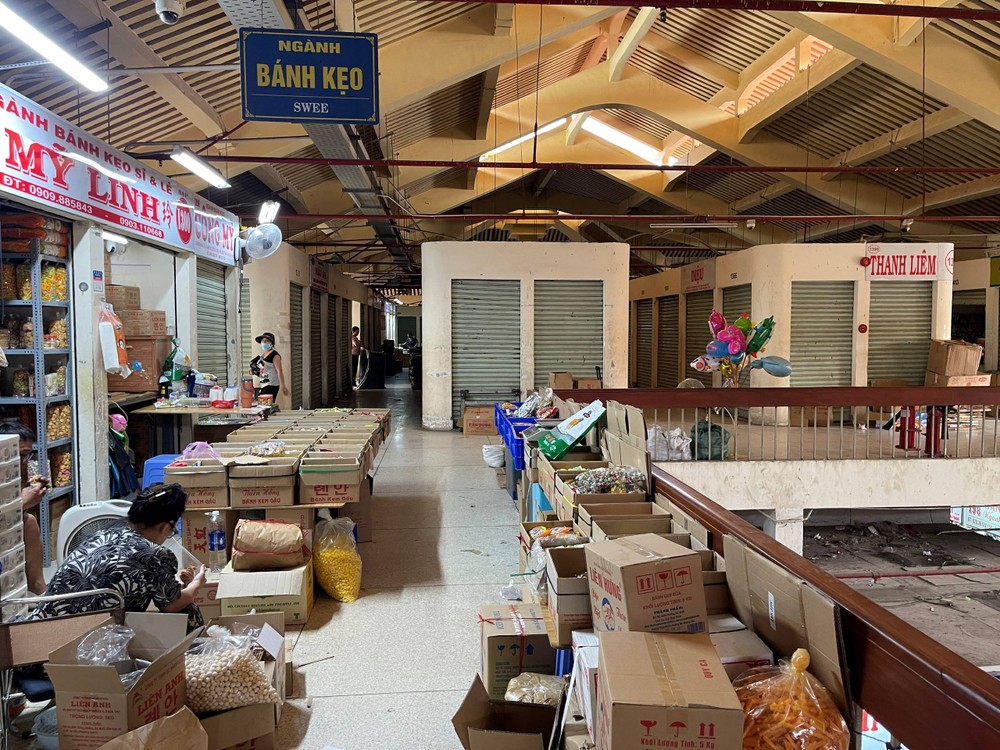Although business households and small traders are now prepared to comply with regulations on invoicing and product origin, they remain deeply concerned about the overwhelming quantity of unsold inventory.

SGGP reporters have continued to observe a stark reality in recent days: traditional markets and once-bustling specialized shopping streets are now largely deserted. The usual vibrant trading activity has painted a concerning picture for local businesses.
At An Dong, Tan Binh, and Ba Chieu markets, numerous stalls and shops remain closed or partially open, with goods not displayed out front.
A small trader at Ba Chieu Market moaned that while she closed the booth, she still worried about many daily expenses and taxes adding that but if she opened the booth, she was sure that she would definitely be heavily fined by the authorities because she didn't have invoices of most of the goods or documents to prove their origin.
Meanwhile, a shop assitant selling accessories at Tan Binh market said that most of the goods are second-hand goods or goods without any documents of origin.
An elderly woman at Ba Chieu Market expressed concern: Traders in the market are all older people who have been selling traditional goods for decades. We’re not familiar with technology and don’t know how to obtain invoices or documentation for our products."
Similarly, vendors at An Dong Market in District 5, Binh Tay Market in District 6, and Tan Binh Market in Tan Binh District reported that their inventory levels are substantial—worth up to billions of Vietnamese dong—yet much of it lacks proper input invoices. They warned that if regulations are enforced too rapidly, they will have no way to sell off existing stock, potentially leading to bankruptcy.
The Management Boards of Binh Tay Market in District 6 and An Dong Market in District 5 have addressed issues concerning goods in stock before June 1 lacking input invoices, proposing that authorities provide guidance to resolve traders' challenges. The boards are committed to identifying and addressing difficulties to support traders effectively.
Additionally, they will collaborate with the Ho Chi Minh City Market Surveillance Authority and the Tax Teams of Districts 5 and 6 to conduct training and offer further guidance on regulations regarding the origin and source of goods, as well as the issuance of electronic invoices, ensuring traders can operate with confidence.
Lawyer Vu Xuan Hung, Head of the Legal Department at the Vietnam Chamber of Commerce and Industry (VCCI) in Ho Chi Minh City, stated that tax policies and regulations on verifying the origin of goods are essential for fostering a transparent business environment. He emphasized that without these changes, small businesses and enterprises can't achieve growth.
Nonetheless, there are two critical issues to consider which are propaganda and implementation. He suggests that the prevailing negative response is largely a psychological phenomenon, with households disseminating concerns without fully grasping the government's approach.
Director Tran Quang Thang from the Ho Chi Minh City Institute of Economics and Management emphasized that regulatory bodies need to quickly devise a strategy to address the current stockpile of businesses and small vendors. This is essential to prevent panic and trading stagnation, which could lead to significant repercussions for the economy, as these goods hold substantial economic value and are vital for employment and tax responsibilities.
However, this must be approached with caution, as confiscating and destroying these goods would be wasteful, while legalizing them could create an unfair advantage for those who adhere to proper business practices and regulations.
The National Steering Committee against Smuggling, Counterfeit Goods and Trade Fraud ( the National Steering Committee 389) announced that in the first five months of the year, over 34,000 violations related to smuggling, trade fraud and counterfeit goods detected have been reported across the country and they have been handled by the authorities.
Of which, there were over 8,200 cases of trading and transporting prohibited and smuggled goods; over 25,100 cases of trade fraud. The authorities in Ho Chi Minh City paid visits to shops and detected over 5,100 violations related to smuggling, trade fraud and counterfeit goods. Subsequently, inspectors collected fines of over VND1,100 billion for the state budget.
























